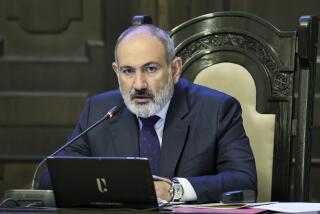Albania Leader Agrees to 48-Hour Truce
- Share via
TIRANA, Albania — In an effort to pacify armed rebellion in the south, the Albanian government agreed Thursday to halt military operations there for 48 hours. In exchange, opposition politicians called on the insurgents to lay down their weapons and accept amnesty.
The agreement emerged from more than five hours of talks between President Sali Berisha and most of his political opposition, their first meeting since he imposed emergency rule to crush an uprising by armed civilians who have seized control of the southern quarter of this country.
Diplomats praised the talks as a breakthrough. But they and Albanian opposition leaders said the agreement fell far short of the demands for new elections and constitutional reform needed to settle the political crisis jolting Albania.
More ominously, reports from Vlore, the southern town that is the center of the revolt, indicated that people there immediately rejected the deal.
Organized in an ad hoc “resistance movement,” rebellious residents in Vlore and other towns have looted army arsenals and are vowing to fight until Berisha resigns.
Squared off in a tense confrontation, rebel and government armies have, according to reports from the area, had minor skirmishes, though an all-out government offensive failed to materialize.
In the last 24 hours, seven people were killed in Vlore, and food supplies, such as milk for children, were beginning to dwindle, residents told aid workers in Tirana.
Berisha’s decision to meet with the opposition--whom he had dismissed until now as Communist traitors who incited the insurrection--came in response to European and U.S. pressure, as well as an awareness that his poorly equipped army might not be willing to move against the rebels, analysts said.
There have been reports of army desertions and officers’ refusal to obey orders to fight their countrymen. Berisha fired the army chief earlier this week.
Besides the suspension of army operations for 48 hours starting this morning, the government and nine opposition political parties called on rebels to surrender weapons over the same period. Citizens who give up their guns and who have not committed “crimes” will be granted amnesty. Berisha also agreed to seek a consensus in naming a new prime minister to replace the one forced from office by the unrest.
“It is not a big step, but it is a step,” Neritan Ceka, spokesman for the opposition Democratic Alliance Party, said of Thursday’s meeting. “What is important is that it . . . opened the dialogue.”
Ceka and others acknowledged, however, that the agreement was unlikely to quiet the inflamed passions of the Albanians who have taken up arms.
“A statement from us is not enough to get them to give up their weapons,” said Skender Gjinushi, head of the Social Democratic Party, who also participated in the meeting.
Collapsing pyramid investment schemes, attractive to a desperately poor population unschooled in capitalism, sucked the life savings from tens of thousands of Albanians. In their subsequent rage, they blamed the government and exploded from riots to rebellion.
Thursday’s meeting took place on the eve of the arrival of a high-level European Union mission and mediators from the Organization for Security and Cooperation in Europe, which was initially rebuffed by Berisha. The EU gives Albania about $300 million in aid, a third of this impoverished country’s national budget.
The West fears that a flare-up in another Balkan hot spot will drive an exodus of refugees into neighboring countries and destabilize the already shaky region.
Whether Berisha, who has routinely outmaneuvered his opponents, is inclined to genuine compromise now remains to be seen. In the meeting, key issues, such as human rights and press freedoms, were not even raised, participants said, in keeping with Berisha’s insistence on controlling the agenda.
“It’s a good first step,” said a Western observer. “But I don’t see elections, I don’t see the constitution--there are a lot of things that are not there. What you do see is the beginning of dialogue. You have a 48-hour window.”
Critics said Berisha will use Thursday’s meeting to demonstrate to international mediators that he is heeding their call for talks--while at the same time conceding little.
“The opposition failed 100%,” said Ben Blushi, editor of the opposition Koha Jone newspaper, whose offices were burned to the ground and whose reporters in the last few days have been repeatedly beaten, harassed and arrested by secret police. “The very first condition should have been fresh elections. It is ridiculous that the United States asks for new Albanian elections and the Albanian opposition doesn’t.”
The human rights situation has deteriorated in Albania since the pyramid collapses catapulted into political protest, in what critics say is a campaign against legitimate dissent.
More to Read
Sign up for Essential California
The most important California stories and recommendations in your inbox every morning.
You may occasionally receive promotional content from the Los Angeles Times.











